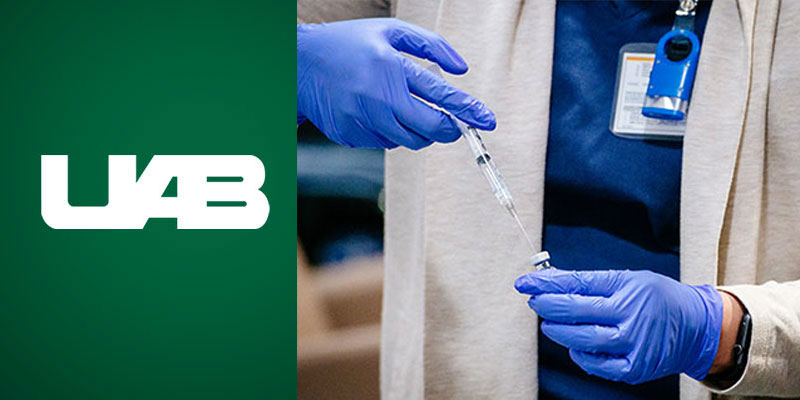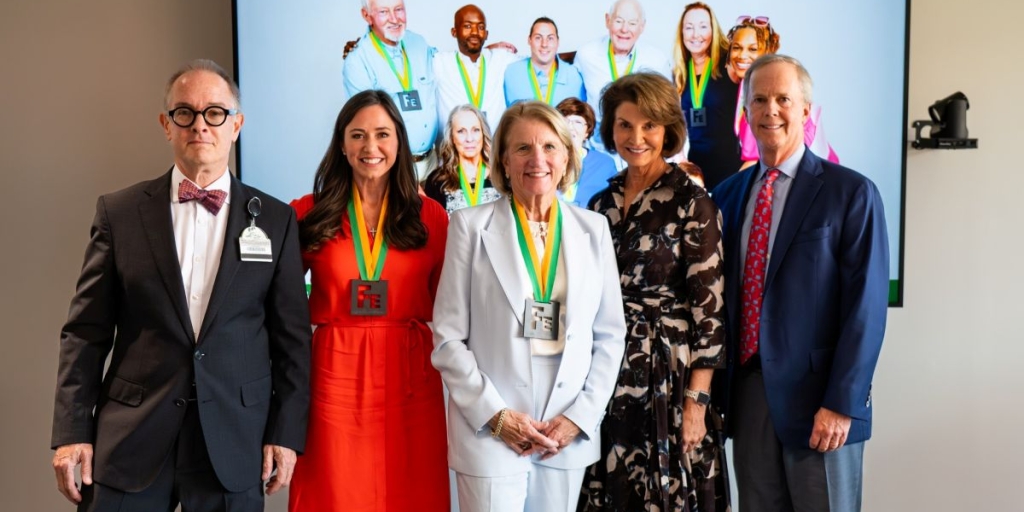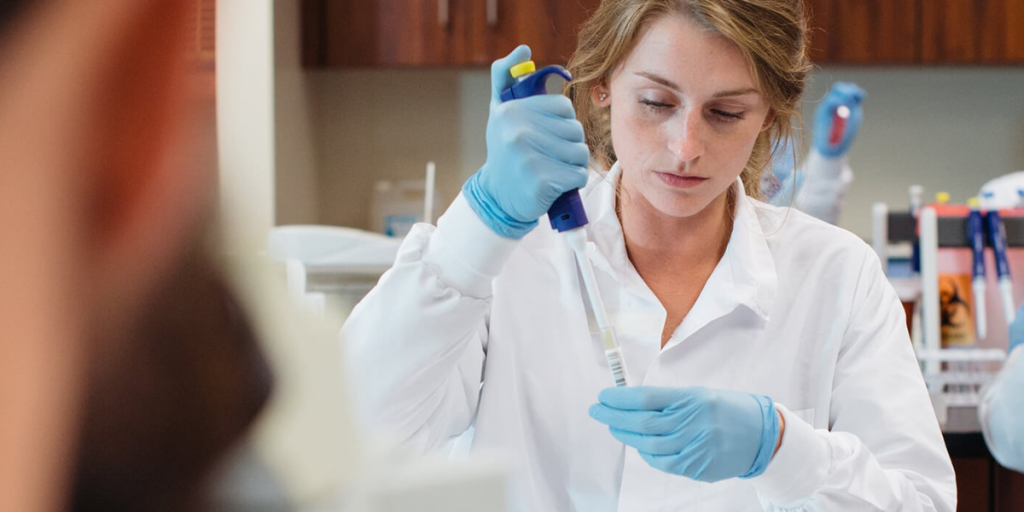Now that the COVID-19 vaccine has arrived, myths and confusion about its safety and efficacy have arisen. Health care experts at the University of Alabama at Birmingham debunk the common myths and set the record straight that the vaccine is safe to receive.
Myth: The COVID-19 vaccine was rushed and will not be safe.
The COVID-19 vaccine was rapidly developed for several reasons. Two of the vaccines, from Pfizer and Moderna, that were shown to be effective are based on novel messenger RNA, or mRNA, technology, and one is based on a recombinant adenovirus vaccine. Although this is the first mRNA vaccine, researchers have been working with mRNA vaccines for 10 years. This technology allows rapid synthesis of clinical-grade vaccines. In fact, within a week after the SARS-CoV-2 sequence was made public, mRNA vaccines were being produced.
Over many years of vaccine studies, we have learned to develop more rapid ways of conducting clinical trials. For instance, most of the COVID-19 vaccine studies have designed Phase 1 (first in human; initial safety) and Phase 2 (safety, dose and immunogenicity) into one study. If Phase 1 shows adequate safety, Phase 2 can start immediately — without designing another study and waiting for more regulatory hurdles. They have also designed Phase 3 (efficacy) studies while the phase 1 and 2 trials were being conducted, based on assumptions that the vaccines would be safe and effective.
All of these vaccines benefited from huge support from the community in the form of participants who were willing to rapidly enroll into studies that vaccinated 30,000 to 45,000 volunteers per study. Such rapid enrollment is somewhat unprecedented. Finally, but sadly, the skyrocketing rates of COVID-19 in the United States and other countries where these vaccines were tested allowed enough infections to occur to give us a rapid answer as to whether the vaccine would work. For the mRNA vaccines, we have safety data on more than 40,000 participants, and they were found to be safe and tolerated with those numbers. Obviously, rare side effects that occur in fewer than one in 10,000 vaccine recipients likely will be missed. However, safety will continue to be evaluated even after U.S. Food and Drug Administration approval. For more information, click here.
Myth: The side effects from the COVID-19 vaccine will be severe, much worse than having the virus.
We have safety data from nearly 40,000 individuals. The most common reactions were injection site reactions (84.1 percent), fatigue (62.9 percent), headache (55.1 percent), muscle pain (38.3 percent), chills (31.9 percent), joint pain (23.6 percent) and fever (14.2 percent). These are short-lived and similar to what we see with the influenza or shingles vaccines. Severe reactions were very rare (<5 percent). Remember, these side effects mean that your immune system is responding to the vaccine and creating antibodies against COVID-19.
Myth: Many people already have died from the COVID-19 vaccine trials.
No patients have died from receiving any of the vaccines during the trials. One patient in the AstraZeneca trial died; but this person received a placebo, not the actual vaccine.
Myth: If I have had COVID-19, I won’t have to get the vaccine because I am already immune.
Most patients develop antibodies after they have COVID-19, but not all patients do. In other coronavirus infections (such as the common cold), we know that these antibodies last only three to four months before we are susceptible to infection again. The vaccine produces a strong immune response and lasts at least four months. The Centers for Disease Control and Prevention recommends that patients who recently had COVID-19 should wait 90 days before receiving the vaccine.
Myth: The COVID-19 vaccine was developed as a way to control the general population, through either microchip tracking or nano-transducers in our brains.
False. Nanotechnology is the study of extremely small things and can be used across many fields of science. The vaccines do use nanotechnology through lipid nanoparticles that are the fatty molecular envelopes that help strands of mRNA — the genetic messenger for making DNA code into proteins — evade the body’s biological gatekeepers and reach their target cell without being degraded. The claim that microchips and nano-transducers are in the vaccine stems from a fake video that suggests Bill Gates claimed to have added this technology to the vaccine through piecemealed pieces of video. This is false.
Myth: The COVID-19 vaccines were developed using fetal tissue.
Neither the Pfizer nor the Moderna vaccine uses cell lines that originated in fetal tissue taken from the body of an aborted baby at any stage of design, development or production.
Myth: I might be allergic to the vaccine, but I won’t know until I get it.
The CDC released guidance for those who have allergic reactions:
Because of reports of anaphylactic reactions vaccinated outside of clinical trials, the additional following guidance is proposed: Persons who have had a severe allergic reaction to any vaccine or injectable therapy (intramuscular, intravenous or subcutaneous) should not receive the Pfizer-BioNTech vaccine at this time. Vaccine providers should observe patients after vaccination to monitor for immediate adverse reactions:
- People with a history of anaphylaxis should be observed for 30 minutes.
- All other people should be observed for 15 minutes.
Myth: A vaccine makes you more vulnerable to illness.
This is false. Receiving the vaccine does not make you more susceptible to COVID-19 or other illnesses.
Myth: The timing of the vaccine is suspicious in our political culture.
Operation Warp Speed is incredibly fast in terms of approving vaccines, but this does not mean that the process was not safe. These vaccines have been approved in both the United Kingdom and Canada, which are not part of our political culture.
Myth: There have not been enough tests involving people with underlying conditions.
Patients who are immunocompromised were not included in the initial studies, but we know that patients with underlying conditions are at higher risk of severe COVID-19 disease. The CDC recommends that these individuals may still receive the COVID-19 vaccine unless there is a contraindication (such as an allergy to prior vaccines).
Myth: Vaccines cause autism.
False. Multiple studies have shown that vaccines are incredibly safe and effective in children. Vaccines save lives and prevent both morbidity and mortality from many illnesses. The CDC posted clearly reviewed concerns from parents at www.cdc.gov/vaccinesafety/concerns/autism.html.
(Courtesy of UAB)













